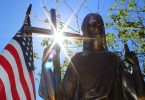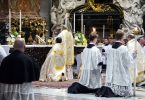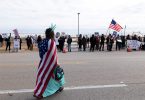
by Rhina Guidos
MEXICALI, Mexico (OSV News) — One was injured, some were tired, but Sister Suzanne Jabro, a Sister of St. Joseph of Carondelet, went around the migrant shelter inviting the mothers to a party.
“Are you coming?” she asked many of the migrant women with excitement.
Mexico, where the women found themselves facing an uncertain future, celebrated Mother’s Day May 10, much like other countries in Latin America where they came from. But far from home, with scarce funds, vulnerable and trying to understand what the May 11 changes to U.S. asylum policy would mean for them, Mother’s Day seemed distant in their memory.
“The women in the shelter, they’ve heard the rhetoric everywhere, what people think about the migrants,” Sister Jabro told Global Sisters Report May 10. “We want them to know that we see them, we hear them, we feel them. We want to share with them. We’re one. And that we’re from the United States and we’re here to welcome them. They’re not alone.”
Along with other women religious and their friends, Sister Jabro pulled off a grand party at the Cobina migrant shelter in Mexicali: live music, piñatas, ice cream, dancing with the sisters, manicures and face masks, which some of the women delighted in, sunburnt after days of walking in the desert.
“It’s special; it makes this day different,” said Idalia Angel Chicas, a Salvadoran mother of two. “We feel as if other people love us, as if we’re important to someone.”
The event was part of what Sister Jabro calls “crossovers,” which involve groups from the U.S., some of them Catholic, some from other faith traditions, visiting migrants at shelters in border towns with help from Border Compassion, the nonprofit she operates. It organizes visits that involve taking humanitarian aid, food and clothes to migrants, visiting with them and sharing a meal to learn about what has made them leave home.
Chicas, the Salvadoran mother, said that while her country’s president has said he has eradicated the gang problem and brought law and order to El Salvador, “criminal elements” were still present in her native home of San Miguel, where gangs were trying to recruit her 11-year-old son. That, coupled with physical abuse she was suffering, made her leave, she said.
“This is humanizing,” Sister Jabro said of the event in a conversation with Mercy Sister Maryanne Loughry, of the Rome-based International Union of Superiors General Migration Committee, who took part in the Mother’s Day crossover. Sister Jabro explained the importance of others hearing the migrants’ stories firsthand, but also sharing moments with them. And they did so with music, dancing and a blessing of the moms — activities whose timing came a day before the lifting of Title 42 of the Public Health Service Act.
The measure, implemented during the Trump administration, kept asylum-seekers out of the U.S. since the coronavirus pandemic began in early 2020. It allowed Border Patrol agents to rapidly expel those seeking to apply for asylum, allegedly to control the spread of COVID-19.
But with its demise, much uncertainty has arrived at border towns and cities such as Mexicali, where migrants have gathered, hoping the changes will favor them and they can quickly cross after the law is lifted. Sister Ann Durst, an immigration lawyer who founded Casa Cornelia Law Center, a legal nonprofit in San Diego that helps migrants, said the changes may result in more deportations. She spoke with some of the migrants at the shelter so they could consider scenarios they might face.
Sister Durst, a member of the Society of the Holy Child Jesus, also visited the center with women religious from the Sisters of St. Joseph of Orange, other Sisters of St. Joseph of Carondelet, Sisters of Mercy and representatives of the California-based Interfaith Movement for Human Integrity. Parishioners from St. Margaret’s Episcopal Church in Palm Desert, California, and students from San Diego’s Academy Our Lady of Peace also visited.
“What I learned today is that one of the gifts we can offer is hospitality of the heart, a safe place for joy and safety to be felt,” Mercy Sister Mary Waskowiak of Casa de Misericordia told Global Sisters Report. “I still remember being with one family and the first words out of this 10-year-old boy who could speak a little English was ‘I’m bored,’ and that he was one of the first ones to get up and sing and that he was dancing his heart out. And I thought, there is a place for celebration that softens suffering. … That was a good lesson for me.
“It invited us into being with them and not just watching and maybe serving,” she said.
Sister Lisa Buscher of the Society of the Sacred Heart, who helped organize the event, danced with some of the children as musicians played banda music, typical of Mexico. She said she always learns from visiting the shelters, and much of it from the children. She recalled a visit that involved a child named Jose who was playing with her as candy was being passed around. When she didn’t get a piece, “he reached into his pocket and offered me a candy. My eyes teared up and I felt like I just got Communion, and my prayer was ‘God, help me be that generous.'”
Hilda Cruz, of the Interfaith Movement for Human Integrity, shared with migrants at the shelter her migration story from her native Mexico, entering the U.S. as a child without legal permission. She benefited from an amnesty law signed by U.S. President Ronald Reagan in the late 1980s. The next few days (following the lifting of Title 42) might be difficult and policies may not benefit them, she said, but she encouraged them to remember that “we all belong to this land. We have a dignity that God has given us. We’re not what a narrative tells us we are, which is that we do not belong.”
Sister Jabro, who grew up near Los Angeles, said the idea for the crossovers came from her experience of not knowing much about the border region, even though it was close to home.
“I realized, this was a sacred space for transformation,” she said. Her role as founder of Border Compassion, she realized, was to invite people to share in that transformative experience.
“I find that after that, the Spirit works with them on how they’re going to share their gifts. I can’t say ‘think this,’ but now . . . they have a face to immigration,” Sister Jabro said. “This is growing awareness, saying ‘come and see.’ And when they do, it ignites the spirit within them.”






